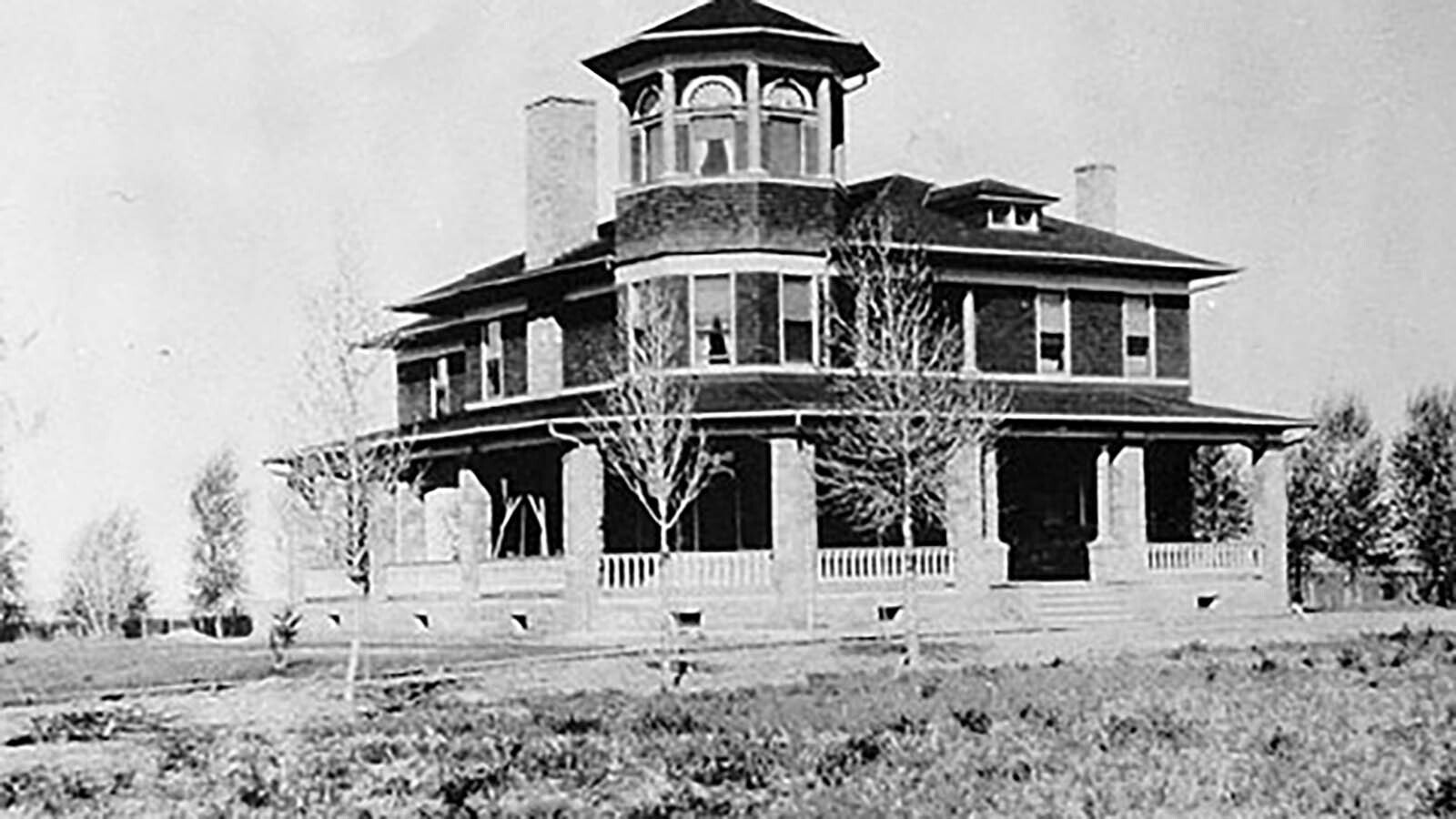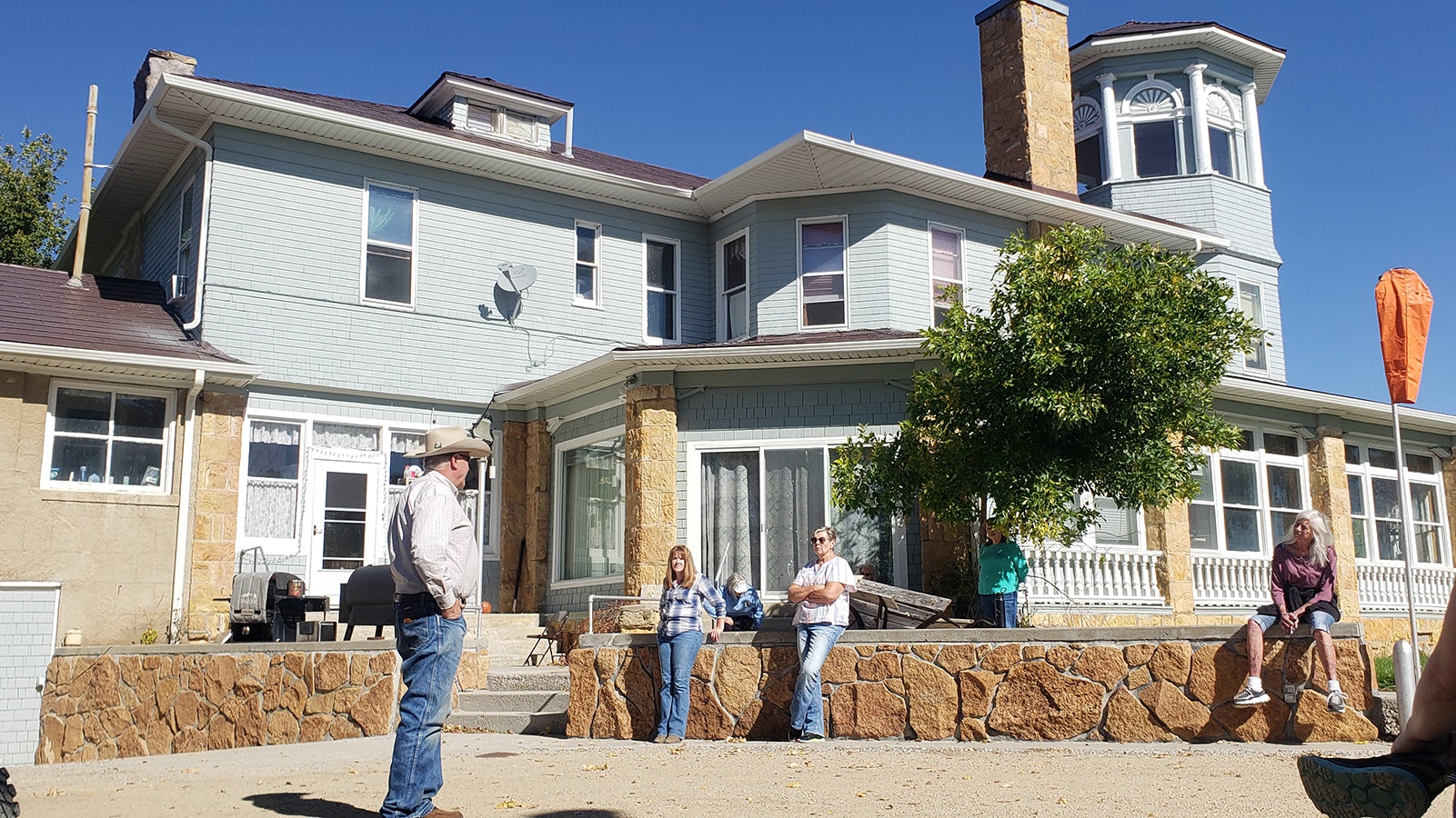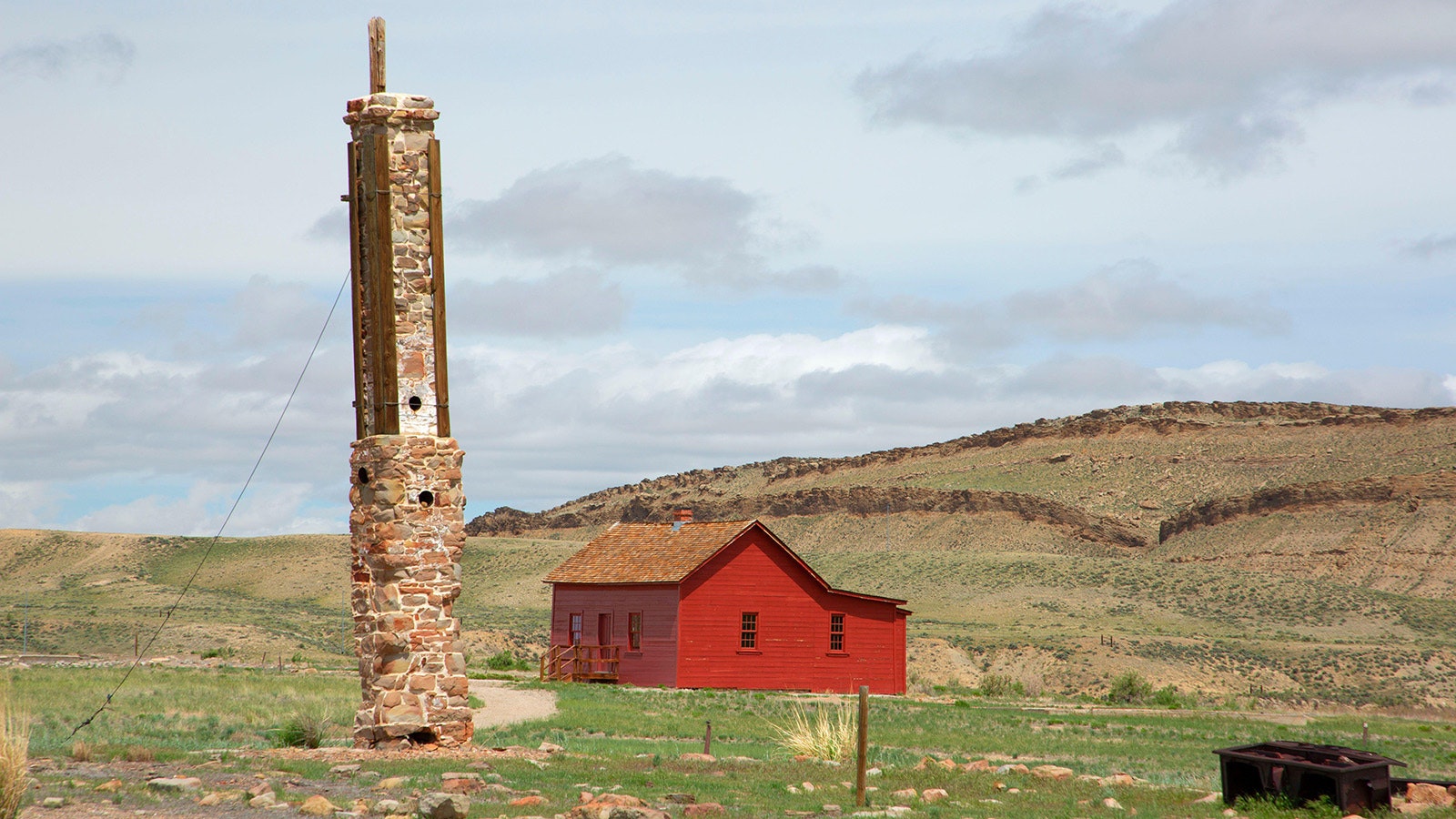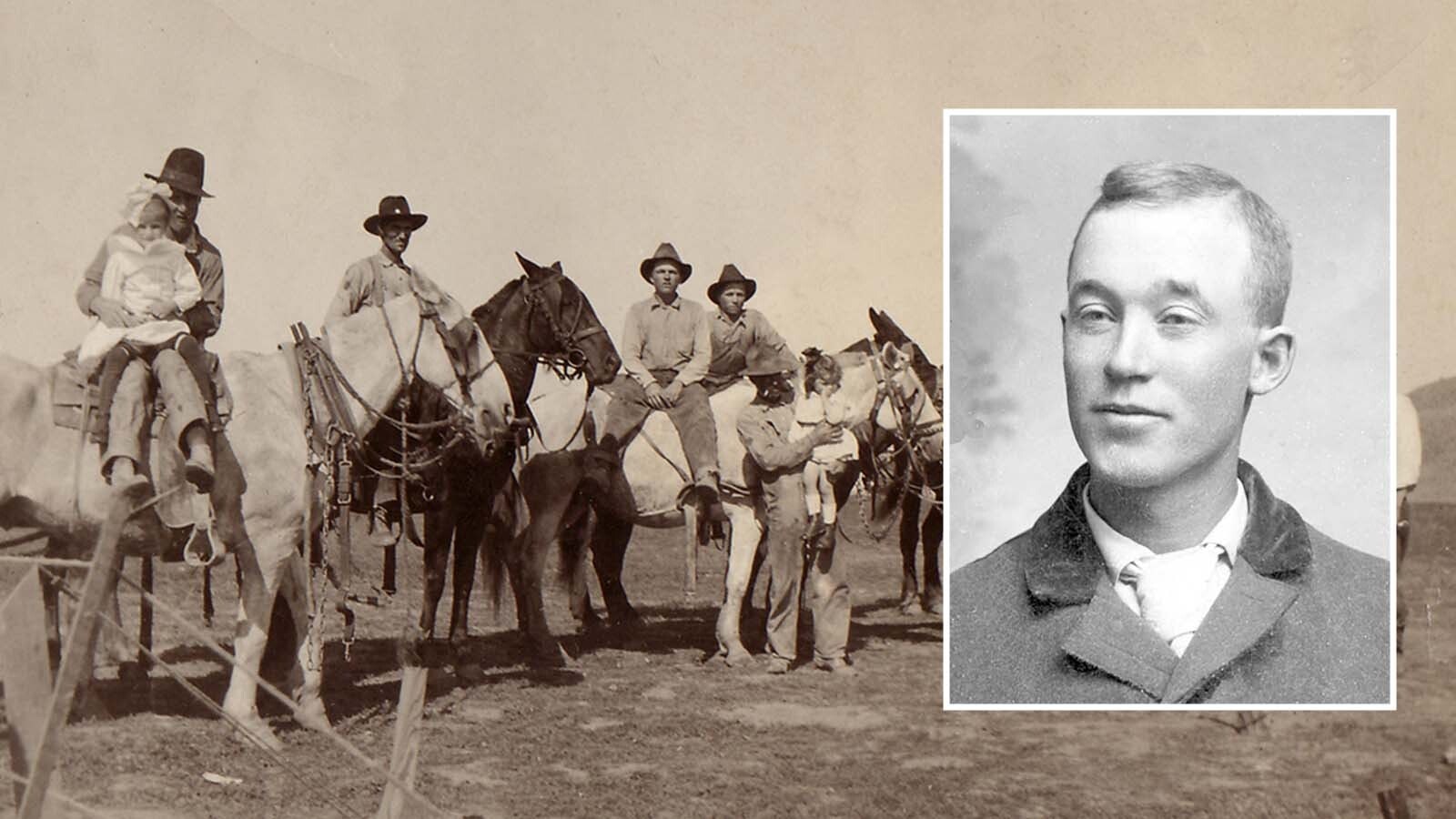The last thing you might have expected to find in Lost Cabin, Wyoming, in 1901 was a mansion or a full orchestra.
Outlaws like the Wild Bunch still roamed the region, but so did prosperous sheepman J.B. Okie. He had built up his own town of Lost Cabin, rumored by the Casper Star Tribune to have been named after a lost gold mine.
Okie owned every building, from the company store to the blacksmith shop. A stagecoach would cut across the region regularly, delivering the modern world to this remote outpost, according to an Aug. 1, 1901, Natrona County Tribune story headlined “Over The Stage Line.”
Mary Helen Hendry shares first-person accounts in her book “Tales of Old Lost Cabin and Parts Thereabouts,” which captures a moment of history when a party erupted into excitement.
The night was still young on this particular summer night, according to Hendry, and a dance was in full swing. The partygoers were unaware of the gunslingers who rode across the plains toward them.
Okie’s wealth was on full opulent display — especially in his exotic aviary that locals still talked about decades later, according to wyohistory.org.
Even peacocks strutted across the well-manicured lawn. Macaws, cockatoos and birds of paradise settled down to sleep despite the boisterous party inside the mansion.
Occasionally, a nighthawk would sing out, joining the orchestra for a brief moment before it flitted on, chasing the bugs until sunrise. The landscape surrounding the lilac bushes and roses was sparse, dotted for miles with overgrown rabbit brush and herds of sheep, huddled together under the waning moon.
The two horsemen drew closer, leading a herd of horses, Hendry wrote.
The gala was being hosted by Okie, the founder of Lost Cabin, a small community located just over 30 miles from the town of Shoshoni. He had built his sheep empire in this remote wilderness and was the largest employer in the area, from shopkeepers to accountants.
Inside his grand mansion, nicknamed the Big Tepee by the local tribes, the long-anticipated gala was in full swing with people from miles around in attendance, according to accounts.
Ladies, dressed in their best gowns and jewelry, gossiped over the delicacies when not dancing around the room with the gentlemen in their fine suits. A full orchestra played the latest tunes as couples snuck out under the moonlight to exchange pleasantries.
Into this magical scene, a trail-weary and dusty Sheriff Frank K. Webb rode in with a shackled prisoner.

The Outlaw
Worland historian Lawrence Woods writes in “The Lives of Otto Chenoweth” that the outlaw with Webb was Otto Chenoweth, the well-educated son of a wealthy family from back East.
He had told his mother he was heading West to paint. However, his friendship with the cheerful, adventure seeking outlaws in the remote Wyoming landscape lured him into a life of crime.
An expert horseman, Chenoweth had been staying at Walt Puntney’s ranch on Bridger Creek wrangling horses. Walt had a reputation for helping out those in need of a hide-out, and Chenoweth successfully stayed out of sight of the law.
Until, that is, the urge to “borrow” the neighboring horses led to his arrest, Woods wrote.
Webb of Natrona County had nabbed the wayward young man on Bird’s Eye Pass. At the time of his capture, Chenoweth was in possession of a herd of stolen horses, some of which belonged to Okie.
By 9 o’clock at night, the two men arrived at the Okie mansion on the same evening as the party to let Okie know that he had recovered his horses.
Mindful of the guests, Webb knocked on the back door and an answering houseboy was dispatched to retrieve Okie from the party.
Always the generous host and delighted to have his horses back, Woods describes how Okie cheerfully invited the Sheriff to tie up his prisoner and enjoy some refreshments in the kitchen.
Always Time For A Party
After some persuading, Sheriff Webb agreed that a meal would be a welcome relief after spending so many days in the saddle pursuing outlaws.
Webb and Chenoweth were sat down at the kitchen table, and both were fed the fancy party food. A couple of the male guests came into the kitchen and joined the pair, abandoning the party to ply the sheriff with questions.
Finding an eager audience, the sheriff was soon enthusiastically sharing the stories of Chenoweth’s many crimes, Woods wrote. Meanwhile, Chenoweth became very thirsty and kept asking for water.
Since Lost Cabin’s water wasn’t suitable for drinking, fresh water had been brought in for the event and kept in a cooling dispenser in the butler’s pantry, just out of sight of the kitchen.
At first, Webb fetched the drinks for his prisoner, but after several more requests, Webb told Chenoweth to get it for himself.
Chenoweth would politely make his leave from the table, interrupting the conversation repeatedly much to the sheriff’s irritation.
After one such trip, the outlaw did not return, the story goes.
Suddenly, Webb jumped to his feet in alarm. He rushed into the butler’s pantry and, to his consternation, realized immediately that Chenoweth had vanished.
Outlaw On The Run
Hendry said that the sheriff’s reaction shocked the ladies, and they remembered the oaths he shouted years later.
Webb had roared with indignation. He pulled his gun, heaved his shoulder against the swinging door to the dining room and burst into the drawing room with the dancers.
Stunned, the orchestra’s music whined to a halt as everyone stared at the intruder.
Webb waved his gun in the air, shouting profanities, “We have got a cutthroat out there on our hands!” Woods recounts.
Pandemonium broke out on the dance floor. Women screamed while others nearly fainted with fright. The men were ordered by the sheriff, “Go after the son-of-a-gun!”
Throwing social etiquette out the window, Webb continued to swear in front of the ladies, calling Chenoweth every curse word he could think of.
“That bloody outlaw couldn’t have gotten far!” he bellowed.
The men followed the sheriff into the night in search of the escaped horse thief. The women remained behind, huddled in the center of the room, waiting in mounting terror for the sound of gunfire or a confrontation with the escaped prisoner.
A man “not dressed just right to attend the party” moved through the dancers, chivalrously excusing himself as he made his way toward the front door, according to Woods’ account. The women barely noticed him for, by now, some of them were leaning out the windows to follow the progress of the manhunt.
Webb could be traced by his loud curses and insults hollered at his escaped prisoner.
According to Hendry, one search group tripped over a couple near the lilac hedge and made a citizen’s arrest before they realized that they had flushed out a pair of embarrassed lovers.
Soon the search was over. Chenoweth had been found.
He was huddled in an irrigation ditch near the house, afraid for his life. He claimed that he had not intended to escape but had gone out for a breath of air. When the commotion started, he had hidden himself for fear of being shot by the wild-eyed sheriff.

Forever The Gentleman
Webb led the way back into the elegant mansion, prisoner in tow and the search party following.
They marched through the front hall and into the drawing room. Chenoweth stopped abruptly, halting the procession, and bowed very low to the ladies.
He expressed his regrets for delaying their festivities, then he proceeded to apologize for the rude ungentlemanly behavior and rough language of the sheriff, according to historical accounts.
Webb sputtered and restrained a string of oaths. He shoved Chenoweth back into the kitchen.
The orchestra struck up a lively tune, but as people danced around the drawing room, the ladies could not stop talking about the horse thief and his elegant manners. The more they talked about the horse thief, the more gallant he seemed.
Before the evening was over, the ladies had declared Otto to be more of a gentleman than “that sheriff” who had entered the room waving a gun, scaring everyone and cursing in the presence of ladies.
Webb took his “gentleman horse thief” to Casper, and then on to South Dakota, where he was tried for another horse theft.
Eventually, Chenoweth was sent home with his irate mother who had arrived to bail out her “insane” son. She promptly confined him in a private sanatorium to cure him of his desire to steal in an unsuccessful attempt to end his career as a Wyoming outlaw.
Jackie Dorothy can be reached at jackie@cowboystatedaily.com.





